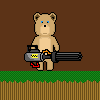Hi,
Firstly i would like to say hi to you all, i have been silently stalking this website for a while now, and found many interesting articles and topics.
I am a 2nd year Bsc Computer Game Development student (about to go into 3rd year come September), and for our dissertation we will be have to make a game (in a group), the scope is pretty open, we are able to use any engine, no theme, any genre. I got the go ahead from my lectures to create my own 2D game/game engine from scratch (although i will be using SOME middleware such as FMOD). I am really excited to do this project, but I am slightly worried, from what i have heard is that most, even 2D games, take about 2+ years to make. I understand the more complex the game, the longer the development. Am I right to be concerned with the amount of work?
Just a little information about the project and a small bio about myself, We will be starting it in June/early July leaving a year to complete it, I will be the main programmer of the project, although others in my group also have programming experience. The language of choice is C++ (although I am proficient in java too). We will be using DirectX9 (because that's all the books on 2D engines I could find did) but I would prefer to use openGL because of the cross-platform-ey-nuss (that’s not a word is it?) (can can't seem to find any good books on the subject, let alone, a good section on 2D graphics, if anyone knows any please can you leave a link? thanks). We also have access to quite a lot of industry standard software (thanks to the uni).
I have also seen a few posts on this forum saying "make a simple game such as pong first"; I have made a few of these simple games, including asteroids, pong, minesweeper and a nifty particle system.
We will be using Scrum (using Jira to track the sprints), visual studio 12 pro, and for a math's library, its looking like XNA MATH is the direction we are going in
We are only in concept stage at the moment, so many things can change.
Also does anyone advice towards what genre to stay away from, we have a concept (which we all REALLY like) for a RTS game but the IA of an RTS kind of scares me (although we do, do an advance AI module next year), but I'm sure we/i can work something out.
Also does anyone have any advice about the order of development of the game engine? I would assume, from the books i have read, it would go something like:
- Some Graphical output
- Input
- Level editor (i know there are some free ones online, which we might use)
- [Some awesome mechanic]
- More advance graphical (lighting, Fog of War etc)
- Polish input / mechanics
No doubt I am forgetting something, and will run into roadblocks, but would like to get them ironed out ASAP. Does anybody have any alterations to the order/ any advice?
Many thanks,
any answers will be appreciated.
TL;DR
Any advice on making a game engine?






